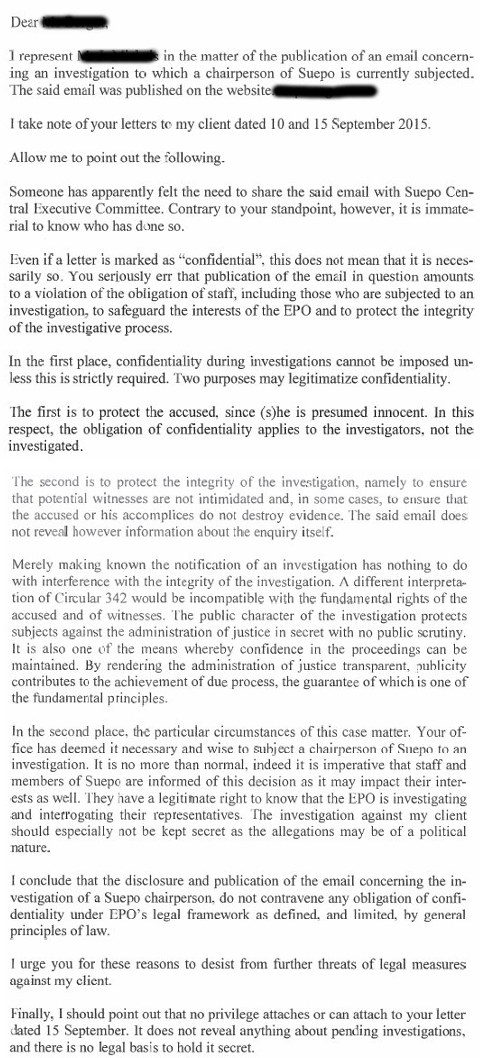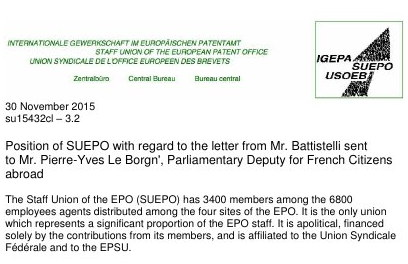SUEPO has just provided a translation of this very detailed article, which is not only unique but also quite broad in terms of scope. We add at the bottom some observations regarding relatively important and unique points.
EPO up the creek – an update
By George Brock-Nannestad 24 Nov 2015 time: 17:12
The European Patent Office (EPO) is facing a number of difficult issues at the moment. Only one of these has risen to the surface in the Danish press: the extremely poor relations between the specialists’ “trade union” SUEPO and the management of the EPO. There is human interest in that. The reason is that the professional staff have a different view of what constitutes responsible administration than does the management, which looks purely on the production figures, i.e. patents issued and earnings. In recent years, “productivity” has been pushed higher and higher, but earnings were already excellent, as case processing was regarded as the primary activity. For many years, this was the result of member states having transferred assessment and approval of European patent applications to this Munich-based institution so that approved applications could become patents in the member states.
“What has happened is that the EPO’s management regards the EPO as being in competition with patent offices in countries such as South Korea or the US.”Unfortunately, this complex controversy between management and professional staff takes the spotlight away from some very worrying developments at the EPO, which are thus allowed to proceed in the shadows. Talk about burying bad news!
In the international press, there has been a much stronger focus on the change in the EPO’s focus that is happening right now, especially under the current President, Benoît Battistelli, former director of the French patent office (INPI), and the Administrative Council (AC), of which the general manager of the Danish Patent and Trademark Office Jesper Kongstad is chairman. The fact that a business journalist from Jyllandsposten magazine is also called Jesper Kongstad makes things a little confusing.
“It is almost commonplace for European patent applications to lie for more than 10 years before a letter is received regarding the start of real case processing.”What has happened is that the EPO’s management regards the EPO as being in competition with patent offices in countries such as South Korea or the US. That is a completely distorted angle for an institution specifically tasked with serving a number of member states, i.e. by processing applications to enable patents to be issued in those states. There is no competition here, except for the patent authorities in the member states, which can of course still receive, process and, if relevant, approve patent applications in their own languages.
When the Patent Cooperation Treaty (PCT) came into being almost simultaneously with the creation of the EPO, a number of PCT states simultaneously made available case-processing capacity to enable fulfilment of the PCT’s promise of giving a provisional assessment of patentability. The US Patent and Trademark Office, the Swedish Patent and Registration Office and the EPO were quickly approved as “International Searching Authorities”. Denmark, Norway and Iceland were late arrivals with what was known as the Nordic Patent Institute. However, South Korea and China’s State Intellectual Property Office have now signed up, and there are approximately 20 patent offices capable of undertaking this work. Thus, there is competition to bring about the best documentation of the familiar technique, and the EPO is frequently chosen by US PCT applicants because the work has been done more thoroughly at the relatively low price it charges. For a while, the EPO was overloaded with these tasks, and case processing suffered as a result; lessons were learnt and improvements made. Recently, however, is it these tasks that have gained renewed focus at the expense of case processing? Because, otherwise, how can there be any “competition” as alleged?
“Here, more of a stick than a carrot has been used, and staff feel that they are not allowed to do their own work in a manner that is professionally satisfactory.”This leaves less time for actual case processing, and has led to an enormous backlog of cases. It is almost commonplace for European patent applications to lie for more than 10 years before a letter is received regarding the start of real case processing. You can chase, and that often results in a bit more activity. To many applicants, this lying-time really does not matter at all, because the patent can have validity with retrospective effect. Besides, the annual fee is frozen at around DKK 12,000 after the tenth year, and that amount is far lower than paying the annual fee in all the countries for which validation is gained.
“Some websites have been blocked so they cannot be accessed from the EPO.”However, the management of the EPO wants to reduce the backlog of cases, and that can only be done by forcing staff to work faster in the time that is left over after the PCT work has been done. Here, more of a stick than a carrot has been used, and staff feel that they are not allowed to do their own work in a manner that is professionally satisfactory. In recent years, this professional approach to the work has led to many major conflicts with the management, which leaves no stone unturned when it comes to putting staff in their place, including disciplinary penalties, temporary suspension and outright attempts to smear people. Some websites have been blocked so they cannot be accessed from the EPO. A security firm is used to undertake internal monitoring of the staff, and keyloggers were deployed on their computers – in addition to those deployed in the public areas, which patent agents and attorneys use during client visits. The latter resulted in a rebellion among attorneys, and it is assumed that they were then removed.
“A security firm is used to undertake internal monitoring of the staff, and keyloggers were deployed on their computers – in addition to those deployed in the public areas, which patent agents and attorneys use during client visits.”Below are references to some websites and blogs where professional users of the EPO express their astonishment and bewilderment at the inklings they are able to glean. The EPO makes use of “preferred communication partners” at several locations in Europe, where smear campaigns against the staff are planted. One such example is “Les Echos” in France.
“The EPO makes use of “preferred communication partners” at several locations in Europe, where smear campaigns against the staff are planted. One such example is “Les Echos” in France.”But that is not the worst, even though the poor quality and the dreadful staff policy should cause a reaction in the responsible members states. According to the European Patent Convention (EPC), the overarching regulations governing the functioning of the EPO, there is the administratively independent Board of Appeal (BoA) which should be able to assess whether case processing and its decisions have been properly carried out. This performs the function of a court – especially in cases where a patent application has been rejected, where it acts as the highest instance. Rules have been laid down as to how members of this court function should be appointed. The BoA has issued rulings that did not suit President Benoît Battistelli; with entirely correct reference to the EPC, it has asserted its independence from the other wing of the EPO. As a result, the administration began to harass the BoA; it began to avoid filling the necessary (and approved) jobs, and one member was placed under house arrest (quarantine). As an act by the EPO’s administration, this is contrary to the EPC. Thus, they wanted to try to get the case formally back on track, but this could not be done without involving the Administrative Council (AC) and its chairman, Jesper Kongstad.
“The BoA has issued rulings that did not suit President Benoît Battistelli; with entirely correct reference to the EPC, it has asserted its independence from the other wing of the EPO. As a result, the administration began to harass the BoA…”The procedure for removing a member of the BoA is expressed very precisely in the EPC, and it is the AC that must demand of the BoA that they deal with a dismissal case. The AC was very obviously not in a position to deal with the situation, because it presented material to the BoA (based on an investigation undertaken by a disciplinary committee in the AC) which was so inadequate that the BoA refused to process the case, but instead pursued the claim of the person put in quarantine that he should be paid for the entire period he had been in quarantine. On some of the websites that have discussed the case, it is claimed that Jesper Kongstad was the one who negotiated with the BoA and was sent away with a flea in his ear. Throughout the entire process, the EPO’s administration with President Benoît Battistelli has been operating with more or less clearly expressed plans to move the entire BoA from Munich to a different location, and this is perceived as an attempt to intimidate the BoA.
“Throughout the entire process, the EPO’s administration with President Benoît Battistelli has been operating with more or less clearly expressed plans to move the entire BoA from Munich to a different location, and this is perceived as an attempt to intimidate the BoA.”These events regarding the Board of Appeal: staff reduction and consequently longer case-processing times and a groundless attack on a member have caused the judiciary throughout Europe to express their consternation and contempt in official letters. But all this has been like water off a duck’s back to President Benoît Battistelli and his team, whose stance is that the EPO has diplomatic immunity, and the laws that apply in the member states do not apply here.
“Neither are there any rules to prevent the EPO from agreeing special treatment with “preferred customers”, which, according to an internal memorandum, has been done (some of our largest transnational companies).”The EPC was constructed very sensibly when the convention was adopted in 1973, but did not take into account the notion that the Administrative Committee and the EPO President could decide to act contrary to the spirit of the EPC. There are simply no rules for ensuring that the EPO remains on track with case processing as its main task. Neither are there any rules to prevent the EPO from agreeing special treatment with “preferred customers”, which, according to an internal memorandum, has been done (some of our largest transnational companies). On the other hand, Article 4a of the EPC says that the ministers responsible in the member states must meet at least once every five years to discuss matters relevant to the EPO and the European patent system. The latest revision of the EPC was signed in 2000, and the relevant ministerial meetings have never taken place.
“That is the formula for a state within a state.”Responsibility for the EPO rests with the Administrative Council (AC), composed of officials, usually the presidents of the patent offices in the individual states. The succession for the position of President of the EPO is normally agreed among the AC members, with the chairman of the AC who has been working closely with the President usually becoming the next President. None of the members wish to change this because they are “rewarded” in the AC’s many minor committees. Therefore, none of the ministers want to intervene because they get their information from their officials, the respective members of the AC. Patents are such a specialised field that politicians find it easier to leave matters to their officials. That is the formula for a state within a state. Thus, the subject of the EPO providing in-service training for the individual states’ case-handlers does not even come up, and they also pay travel expenses, board and lodging for the smaller member states. No one wants to rock the boat with an organisation that benefits them so much.
“The German commercial lawyers’ website occasionally also covers the EPO, especially after the EPO had tried to accuse an attorney before a disciplinary committee for having expressed a negative view of the EPO.”As mentioned, the EPO’s activities are being closely monitored by a number of professional blog groups. The most comprehensive one is run by a group of intellectual property attorneys and patent agents and can be found at:
http://ipkitten.blogspot.fr/2015/06/given-…
This particular blog post provides an overview as of 16 June 2015, but a lot has happened over the last five months. The most recent post concerns the unsuccessful attempt at removing a BoA member:
http://ipkitten.blogspot.fr/2015/11/read-i…
Another, more provocative and more strident, blog is:
http://techrights.org/2015/11/22/ac-versus…
This blog was originally created by an attorney who was strongly opposed to software patents. On the one hand, you could say he should have been pleased that the EPO was getting bogged down, but “unfortunately” a number of European patent applications for technical solutions involving software were approved, and accordingly he wishes to assist with discrediting the EPO.
The German commercial lawyers’ website occasionally also covers the EPO, especially after the EPO had tried to accuse an attorney before a disciplinary committee for having expressed a negative view of the EPO.
http://www.juve.de/nachrichten/namenundnac…
If we were to attempt to summarise matters, here is what is currently going on at the EPO:
- there is a desire to be a service company in competition with other patent offices at the expense of the quality of case processing for European patent applications – EPO’s raison d’être
- staffing levels are being watered down in the court-like Board of Appeal, causing rulings to be postponed indefinitely
- there appears to be unrestricted surveillance, intimidation and quarantining of ordinary case handlers, shop stewards and a BoA member in order to put pressure on staff
- the AC is trying to bend the European Patent Convention (EPC) to justify the dismissal of the specially protected member of the Board of Appeal who is currently in quarantine
“Unlike the “preferred customers”, they face significant legal uncertainty.”I cannot see how the EPO can be saved, and especially the conditions applicable to smaller businesses that rely on getting fair treatment. As things stand today, they are at risk of inferior case handling and a Board of Appeal that will take a very long time to come up with a ruling. Unlike the “preferred customers”, they face significant legal uncertainty. Ultimately, a patent advisor will no longer be able to justify recommending that a client should use the EPO; instead, the advice will be to select a small number of key countries and have cases processed at national level. And the legal
uncertainty does not bear thinking about from using the federal patent (UPC), which Denmark has signed up to without knowing what we are letting ourselves in for.
George Brock-Nannestad
One of those last/concluding statements is important. The translation says: “Ultimately, a patent advisor will no longer be able to justify recommending that a client should use the EPO; instead, the advice will be to select a small number of key countries and have cases processed at national level.”
This is why the EPO was so stressed about what I had shown. It was then that it started sending legal threats.
We don’t have much to add except that Brock-Nannestad called me an attorney even though I’m a researcher, campaigner and software engineer (among other things). I’m no big fan of attorneys, as is probably evident from my writings.
The part where Brock-Nannestad speaks about the strategy for destroying the boards is very much reminiscent of what Željko Topić did in Croatia. We covered that a week ago and we encourage board members to learn about what Topić did, leading to criminal allegations in his home country. No wonder a board judge was suspended for allegedly speaking against Topić. █
























 Content is available under CC-BY-SA
Content is available under CC-BY-SA